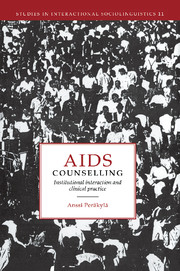Book contents
- Frontmatter
- Contents
- Preface
- Transcription conventions
- 1 Introduction
- 2 Quasi-conversational turn-taking
- 3 The client as owner of experience
- 4 The management of co-counsellors' questions
- 5 Some interactional uses of co-counsellors' questions
- 6 Addressing ‘dreaded issues’
- 7 The interactional power of hypothetical questions
- 8 Conclusion
- Appendix: the data base
- References
- Index
3 - The client as owner of experience
Published online by Cambridge University Press: 02 December 2009
- Frontmatter
- Contents
- Preface
- Transcription conventions
- 1 Introduction
- 2 Quasi-conversational turn-taking
- 3 The client as owner of experience
- 4 The management of co-counsellors' questions
- 5 Some interactional uses of co-counsellors' questions
- 6 Addressing ‘dreaded issues’
- 7 The interactional power of hypothetical questions
- 8 Conclusion
- Appendix: the data base
- References
- Index
Summary
In this and the following two chapters, the notion of the ‘participation framework’, stemming from Erving Goffman's work, will provide us with the theoretical point of departure. To put it in simple terms, in these chapters we will examine how counsellors and their clients relate in various ways to the words that they utter or hear. By relating in different ways to words spoken or heard, they continuously shape, and respond to, the local contexts of their talk.
There are two questioning techniques, based on the Family Systems Theory, which make the speakers' and hearers' relation to the words spoken and heard a particularly interesting theme. Both of these techniques involve certain indirectness, whereby asking a question and answering a question become relatively complicated matters.
One of the techniques is called ‘circular questioning’. In this type of questioning, counsellors ask questions concerning a client's feelings or beliefs, not directly from this client, but from a co-client, who usually is the first client's partner, spouse or other family member. As this co-client describes his or her relative's experience, he or she has a specific relation to the words he or she speaks; and equally, the person hearing a description of his or her own experience has a specific relation to the words he or she hears. ‘Circular questioning’ will be the topic of this chapter.
The topic of chapters 4 and 5 will be another questioning technique, arising from the counsellors' practice called ‘live open supervision’.
- Type
- Chapter
- Information
- AIDS CounsellingInstitutional Interaction and Clinical Practice, pp. 103 - 143Publisher: Cambridge University PressPrint publication year: 1995



